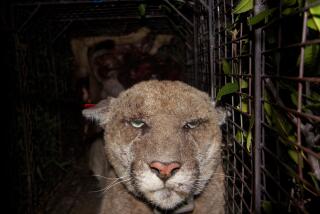Trying Poison on Embargo of Cuba
- Share via
HAVANA — Firebrand Brooklyn pastor the Rev. Lucius Walker Jr. arrived here Wednesday with 80 tons of unlicensed humanitarian aid from the United States in tow. But it’s what the activist plans to bring home next week that will pose a unique challenge to the American economic embargo of the Communist-run island: rat poison.
Walker plans to return with cases of a product called Biorat for distribution to community groups in inner cities, his first attempt to break the blockade by bringing a Cuban product to the U.S.
Biorat combines a healthy dose of salmonella, some phage and a dash of lysine negative into a meal of biological components that its advocates claim can kill the entire rat population of a city while causing no harm to the human inhabitants.
Cuban scientists and their state-owned Labiofam company say they have used the recipe for nearly a decade to decimate the rat populations in aging Havana and in nations as far off as Vietnam, Uganda and Mongolia.
But the four-decade U.S. embargo of Cuba has barred the biological rodenticide--and virtually all other Cuban products--from U.S. markets.
Walker, whose Pastors for Peace group has sponsored a dozen aid caravans that have delivered more than 2,000 tons of aid here since 1992, calls his first attempt to import a Cuban product into the U.S. “reciprocal solidarity.”
“We’re doing a reverse challenge for the first time in history, taking aid from Cuba through this caravan to the United States,” said Walker, who also plans to bring back Cuban-made solar panels. “The blockade is a double-edged sword. It hurts the people of Cuba and it hurts the people of the United States.”
When he returns with the Cuban products, Walker said, “that may be an occasion when the Bush administration may show its true colors.”
Walker and his New York-based Interreligious Foundation for Community Organization have made bridging the gap between the U.S. and Cuba a crusade. They have sponsored American students studying at a Havana medical university and other joint projects, incurring the wrath of Miami-based anti-Castro Cuban Americans.
As in previous visits, Walker will use his presence here to condemn the embargo that he and his supporters in the Black Congressional Caucus have called “immoral” and “a harsh and inhumane policy.” But this visit by a delegation of about 90 religious leaders, scholars, medical students and others, who will tour Labiofam’s factory here today, highlights a Cuban industry little-known across the ideological divide between the island and the vast American consumer market 90 miles away.
Biorat is just one of hundreds of cutting edge biological and genetic products developed by Cuban scientists and marketed by state-owned companies for whom necessity clearly has been the mother of inventions.
Short on money but long on highly educated researchers and scientists, President Fidel Castro’s government invested heavily in several high-profile research institutes that have produced vaccines against meningitis and hepatitis. They’ve also discovered natural interferon, created recombinant drugs and genetically altered tilapia fish that grow months faster than natural ones, and are carrying out advanced human trials of an AIDS vaccine that Cuban officials say holds promise.
For cash-strapped Cuba, which lost billions of dollars in aid with the 1991 collapse of the Soviet Union, all this is for sale.
Beginning in the early 1990s, the government created companies such as Labiofam, a Spanish acronym for Biological Pharmaceutical Laboratories, as profit centers to market scientific breakthroughs abroad and earn vital foreign exchange to pay Cuba’s foreign debts.
Among the most successful products is a rare vaccine against group B meningitis that has proved so effective that U.S.-based SmithKline Beecham Pharmaceuticals spent more than a year negotiating with the U.S. Treasury Department for a license to test and ultimately import the drug. No such vaccine exists in the United States, and in 1999 the U.S. government granted an exception to the embargo and approved the license.
The market for Biorat and other Labiofam products should be equally promising, according to the company’s scientists and salespeople and Walker’s “solidarity” partners here.
Already, Labiofam has signed joint-venture agreements for factories to produce the rat killer in Vietnam and Uganda. The company is in the final stages of joint tests in Brazil of an insecticide that targets the mosquitoes that carry dengue fever and malaria. And it has a whole line of biodegradable soaps, shampoos and skin-care products.
Labiofam contributes more than $6 million a year to the Cuban economy, company officials say.
Officials connected with Walker’s visit are glowing in their praise of Biorat.
“For American cities with rat infestations, Biorat is certainly something unique--something they can use to improve health and quality of life,” said Jose Estevez, who heads the North American department of the Cuban Institute of Friendship with the People, the group sponsoring Walker’s delegation.
“I’m not a technician or a scientist, but I understand that this product has absolutely no secondary effects on other animals, on the environment or on humans,” he said. “It contains a strain of salmonella that only affects rats. In Europe, some technicians actually ate some Biorat to show it has no effects.”
U.S. officials, however, are skeptical.
Although Washington has made no official comment on Walker’s import plans, an official who asked not to be named noted that the product has yet to be tested in the United States, where the standards tend to be a bit more stringent than in Hanoi or Havana.
More to Read
Sign up for Essential California
The most important California stories and recommendations in your inbox every morning.
You may occasionally receive promotional content from the Los Angeles Times.













